Palmaz Vineyards (Napa, CA)
Palmaz Vineyards
4029 Hagen Rd, Napa, CA 94558
707-226-5587
www.palmazvineyards.com
Fri 07/26/2024, 11:00a-12:30p
Following dinner at In Bloom in Paso Robles, we drove up the 101 to the tony town of Los Altos, where we spent the night. The following day, we headed up to Napa Valley for a few rounds of wine tasting prior to dinner, and kicked things off with a visit to Palmaz, located on the grounds of Henry Hagen's pioneering Cedar Knoll Vineyard and Winery (founded in 1881). The property had been abandoned after Prohibition, but was purchased and restored in 1997 by Dr. Julio Palmaz (inventor of the coronary balloon-expandable stent) and his wife Amalia Palmaz, both of whom first got interested in wine while Julio was completing his radiology residency at UC Davis. Today, the couple's two children Christian Gastón Palmaz and Florencia Palmaz are also actively involved in the business, as is Christian's wife Jessica Palmaz.
Palmaz's first vintage was in 2000, but the wine was of questionable quality and thus never sold. The 2001 vintage, however, was commercially available, and was overseen by none other than Randy Dunn. In 2003, Winemaker Tina Mitchell joined the team, and she's still responsible for crafting the wines to this day. Palmaz is probably most known for its commitment to gravity-flow winemaking, a process in which wine isn't subject to mechanical pumping, which some believe can damage it at a molecular level. To allow for this, the winery is built into the side of Mount George, and comprises a series of multi-tiered tunnels that reportedly spans the height of an 18-story building.

Palmaz is available for private guided tours/tastings at a cost of $150 per head, and ours began outdoors at one of the winery's upper levels, where we enjoyed a sweeping westerly view of the property.
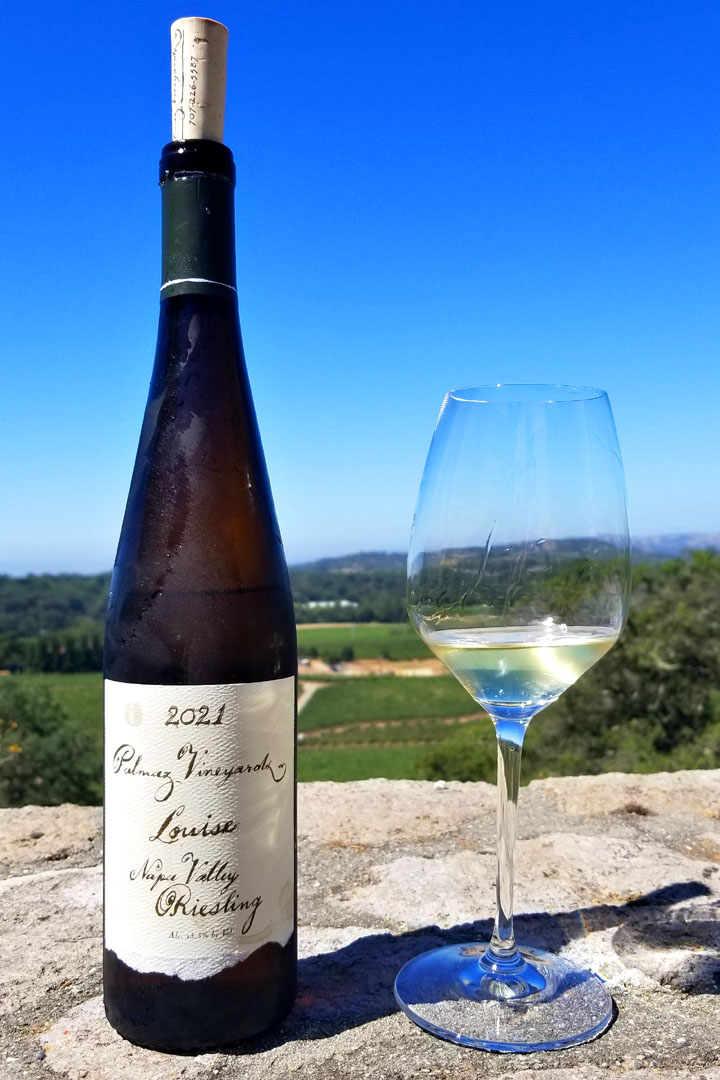
Our Estate Ambassador poured the 2021 Louise Riesling as a sort of welcome wine. Aromas were all about honey and juicy stone fruits, but with an herbaceous edge. Tasting it, I found soft, sweet peaches countered by a spicy savoriness in the background. This was definitely on the easy-going, quaffable side, and made for a fitting start.
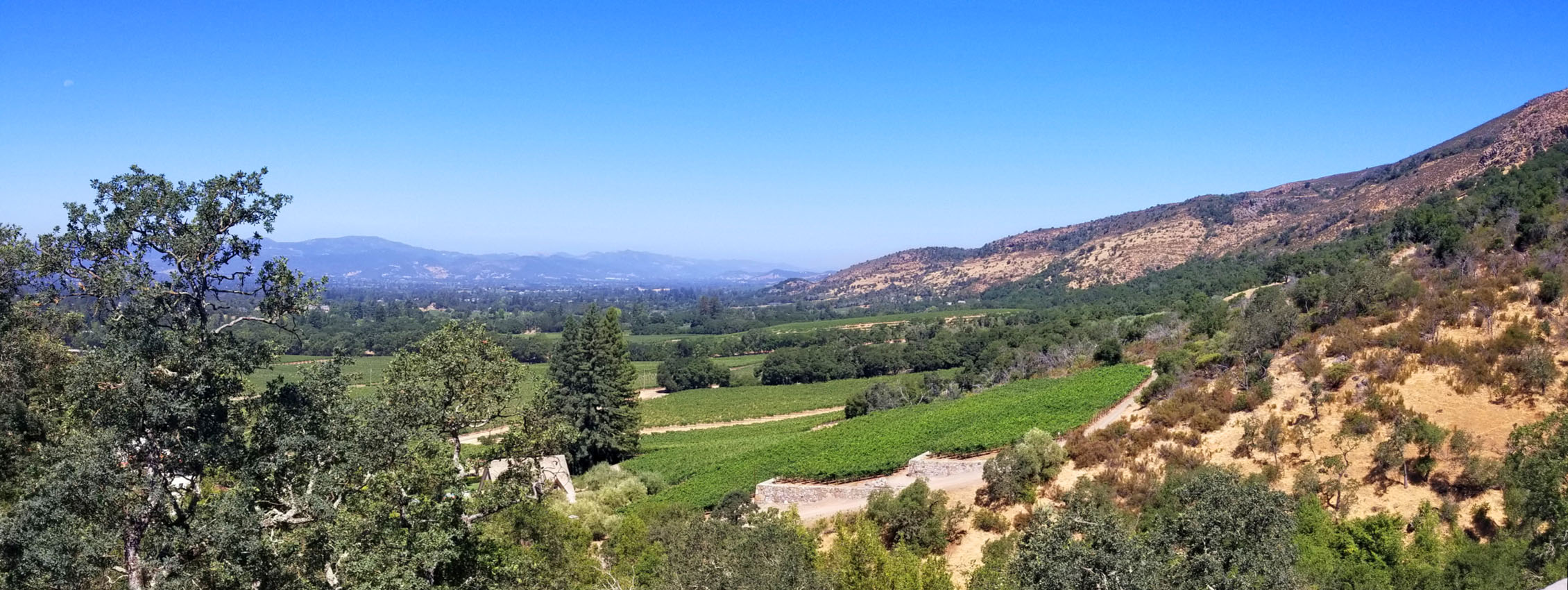
We then moved to a different spot outside, and pictured above is the view to the north.
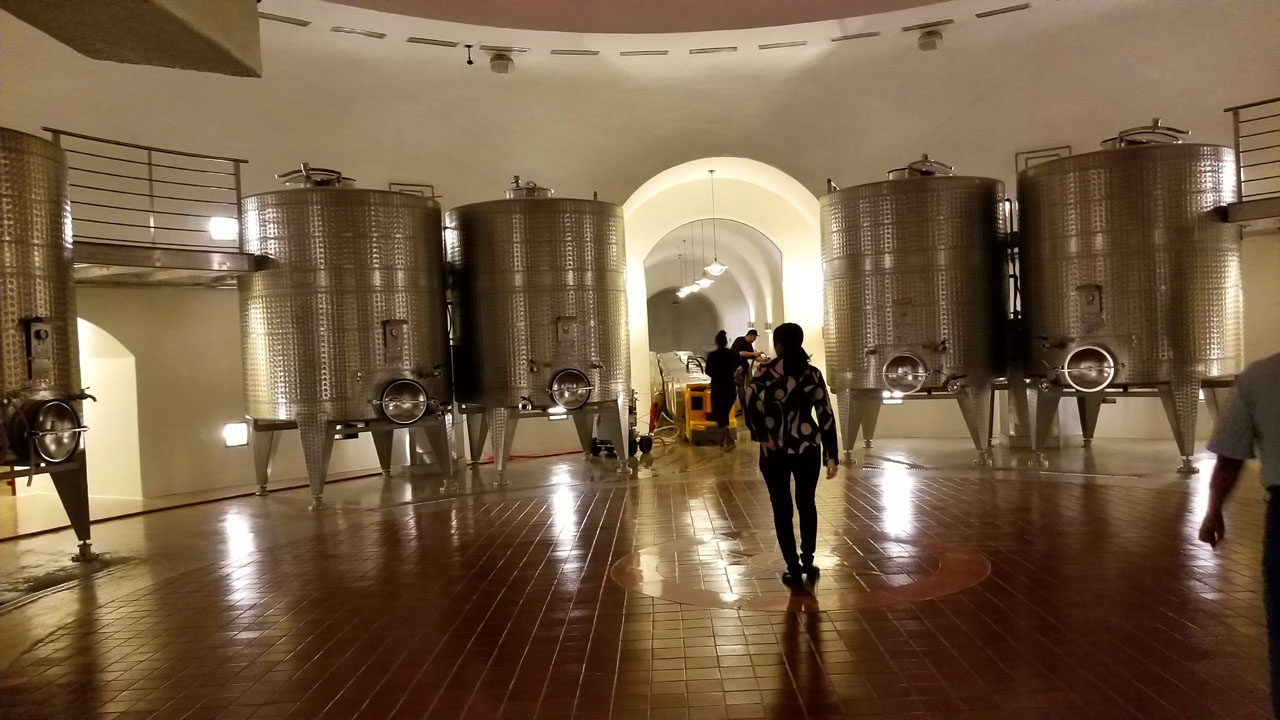
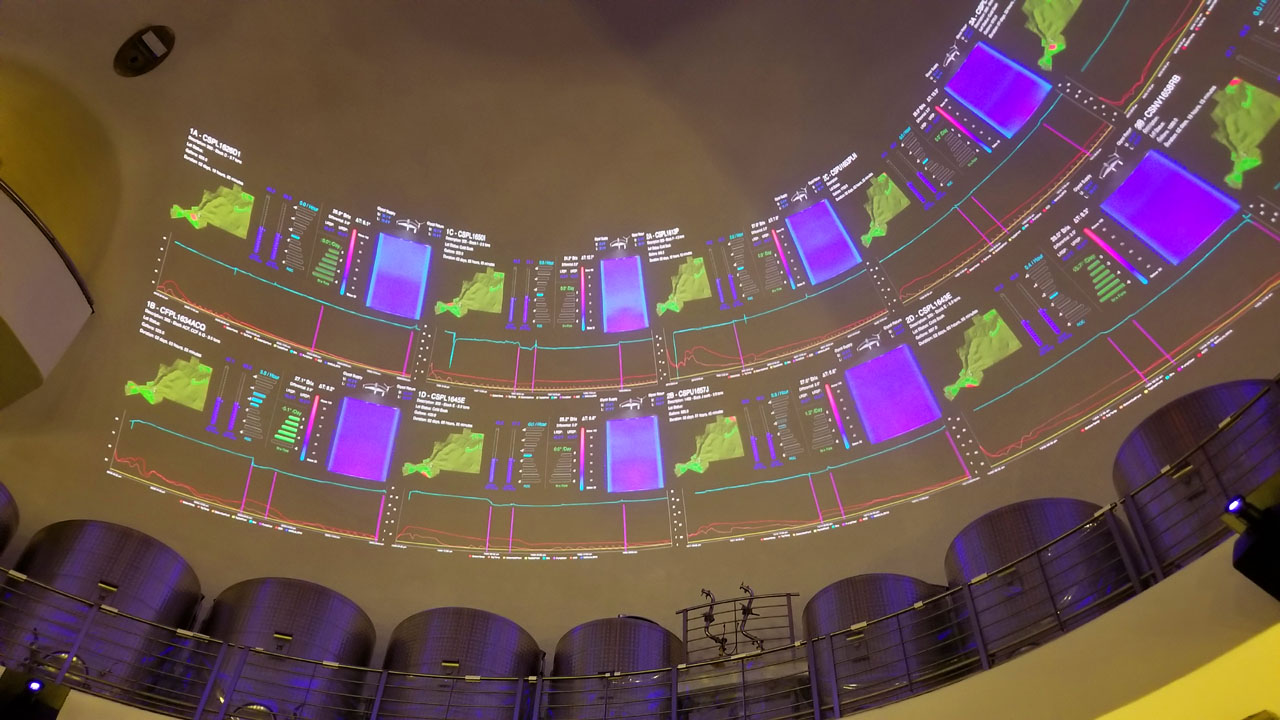
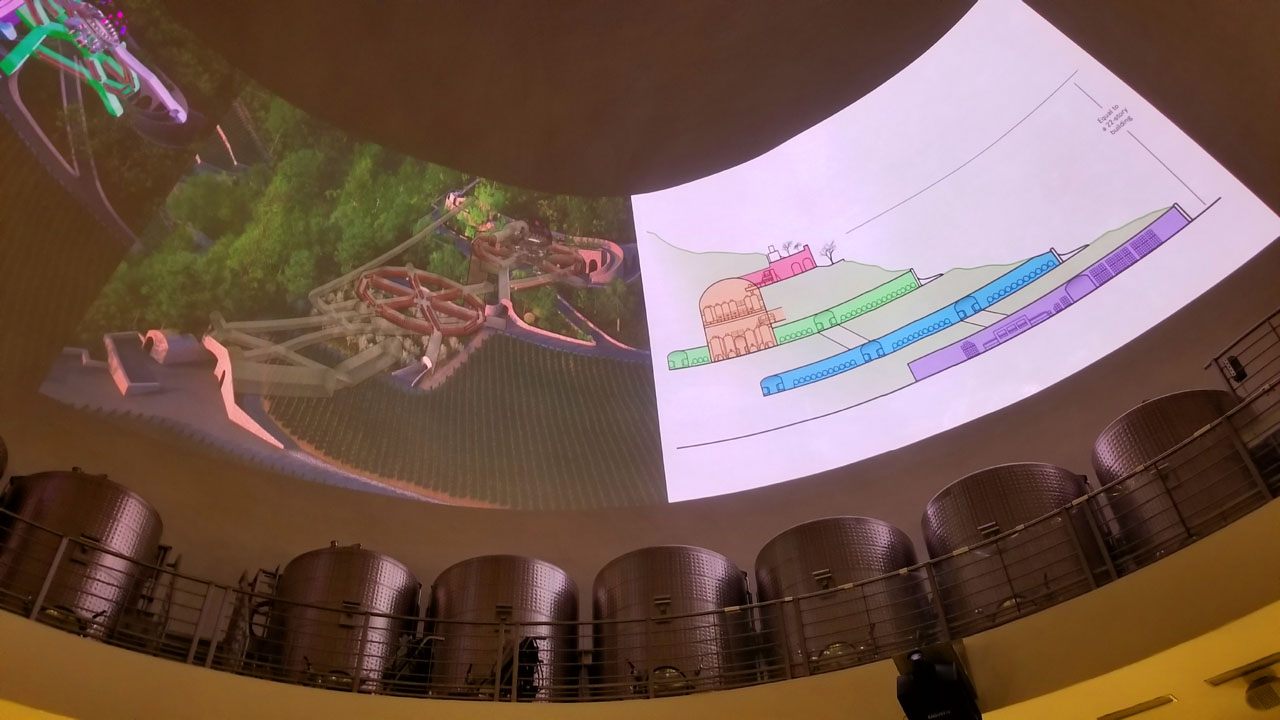
We were later led back inside to view Palmaz's famed "fermentation dome." The structure is lined with 24 fermentation tanks holding grapes from the property's 46 vineyard blocks, and each is tracked by FILCS (Fermentation Intelligent Logic Control System), and in-house developed fermentation control and monitoring system. Data gathered by FILCS can then be projected onto the ceiling. From those 24 fermentation tanks, the juice is then hosed into settling tanks at the bottom of the dome.
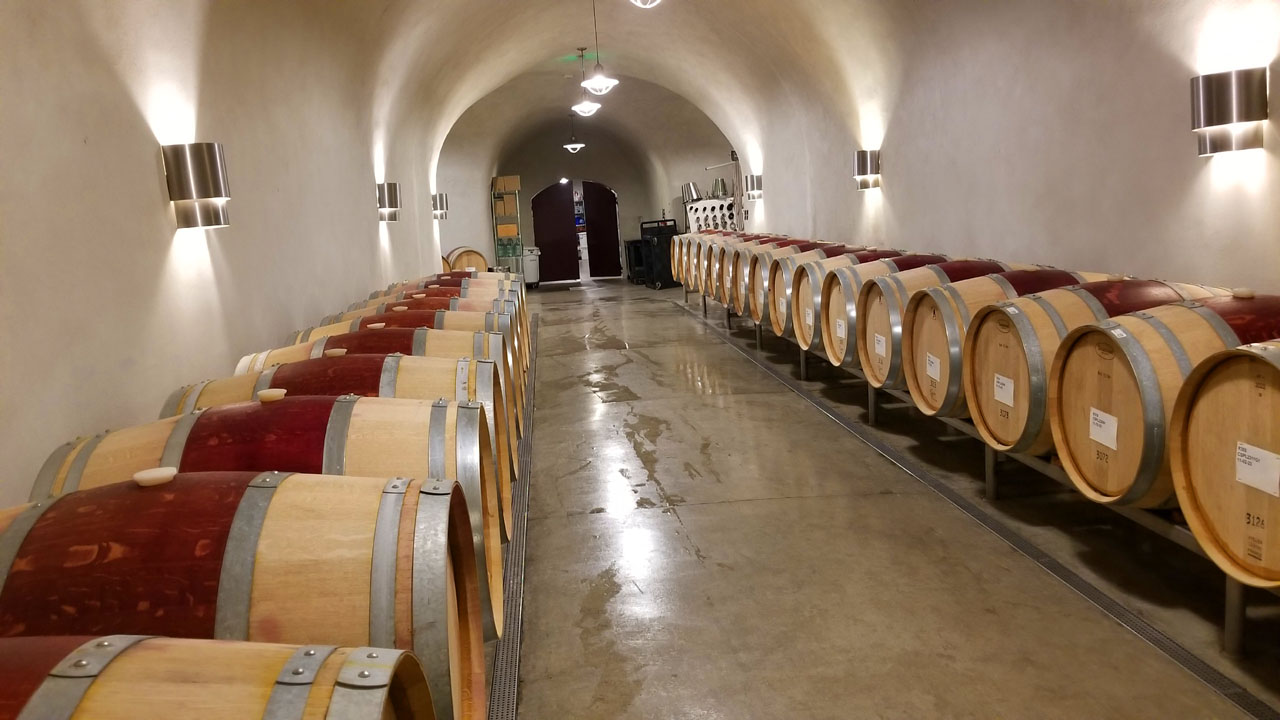
Radiating off the dome are various tunnels containing French oak barrels, where the wine rests for a year. Following, the casks are moved to a lower level for another year of aging.
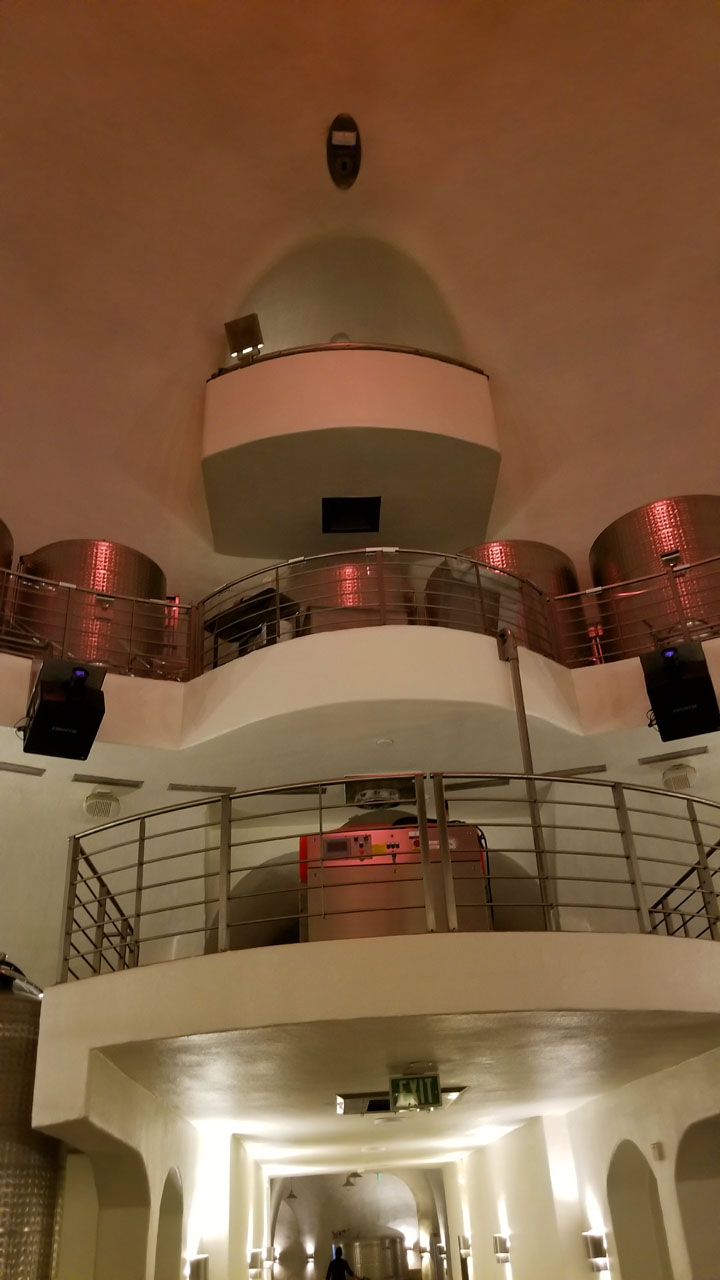
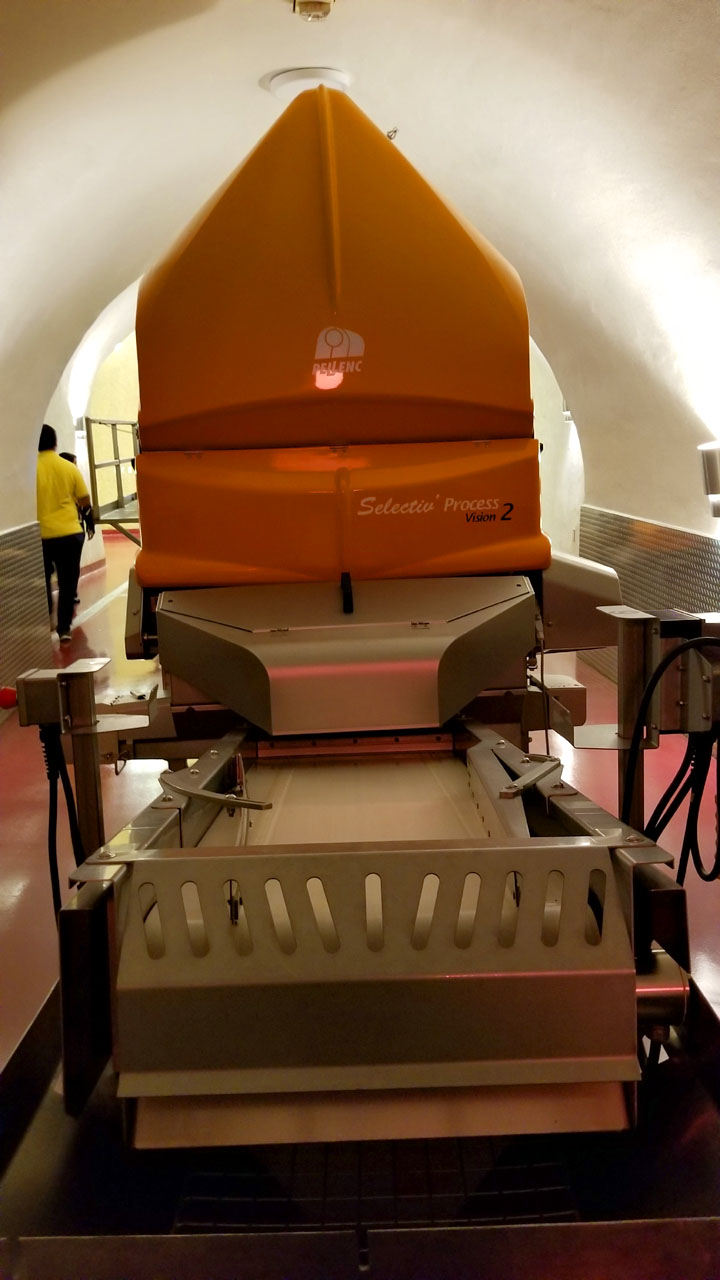
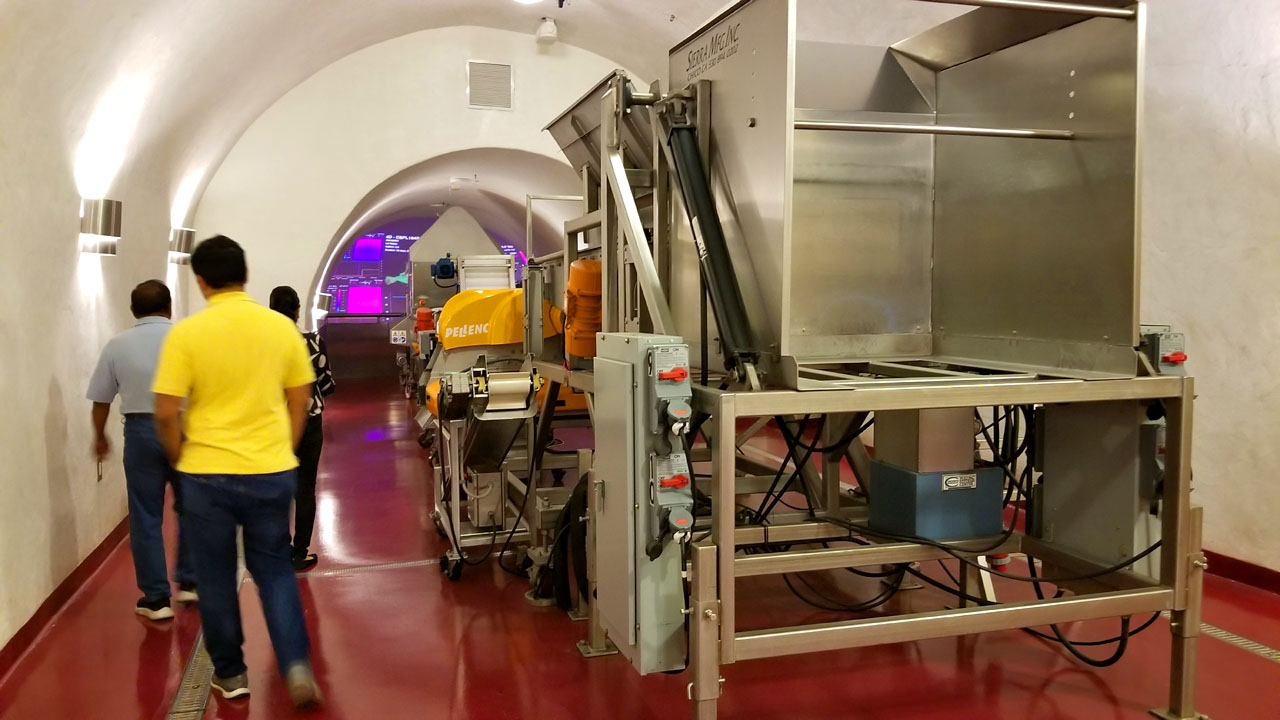
Our group then went up to the highest level of the dome, where we examined the winery's Pellenc Selectiv' Process Vision 2 optical grape sorter.
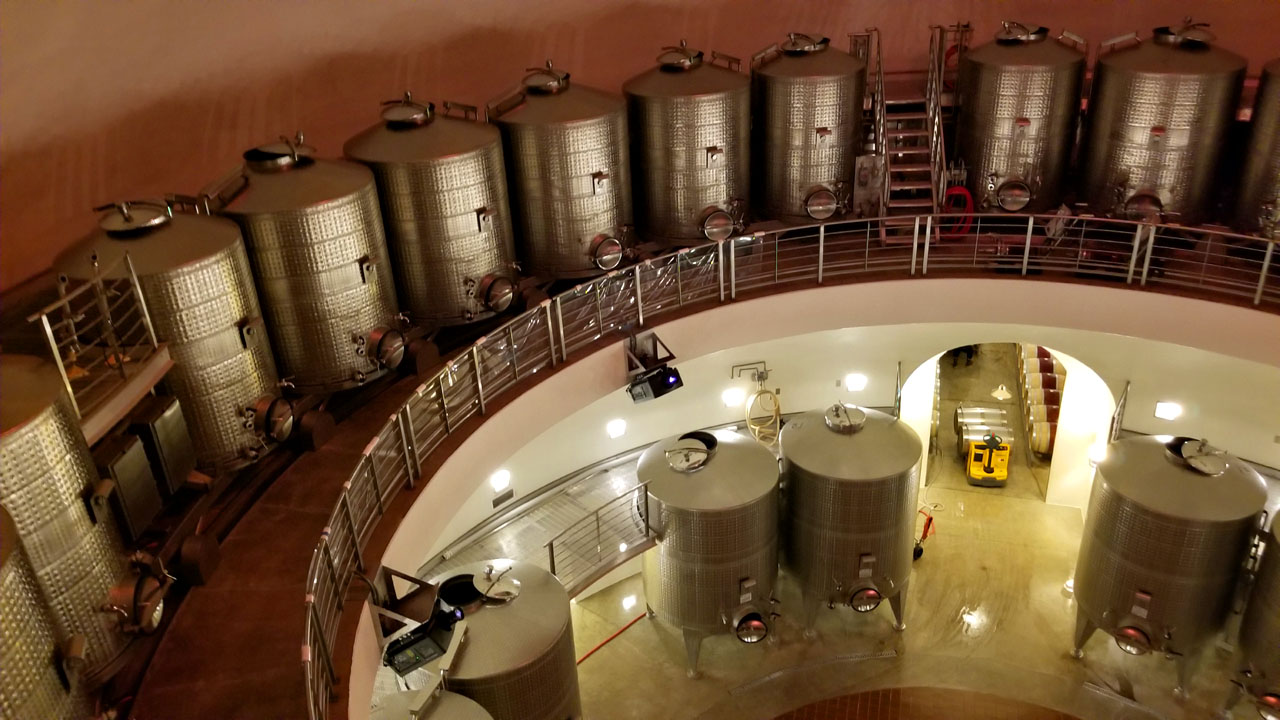
Grapes that make it past the sorter fall through an opening to the fermentation tank level.
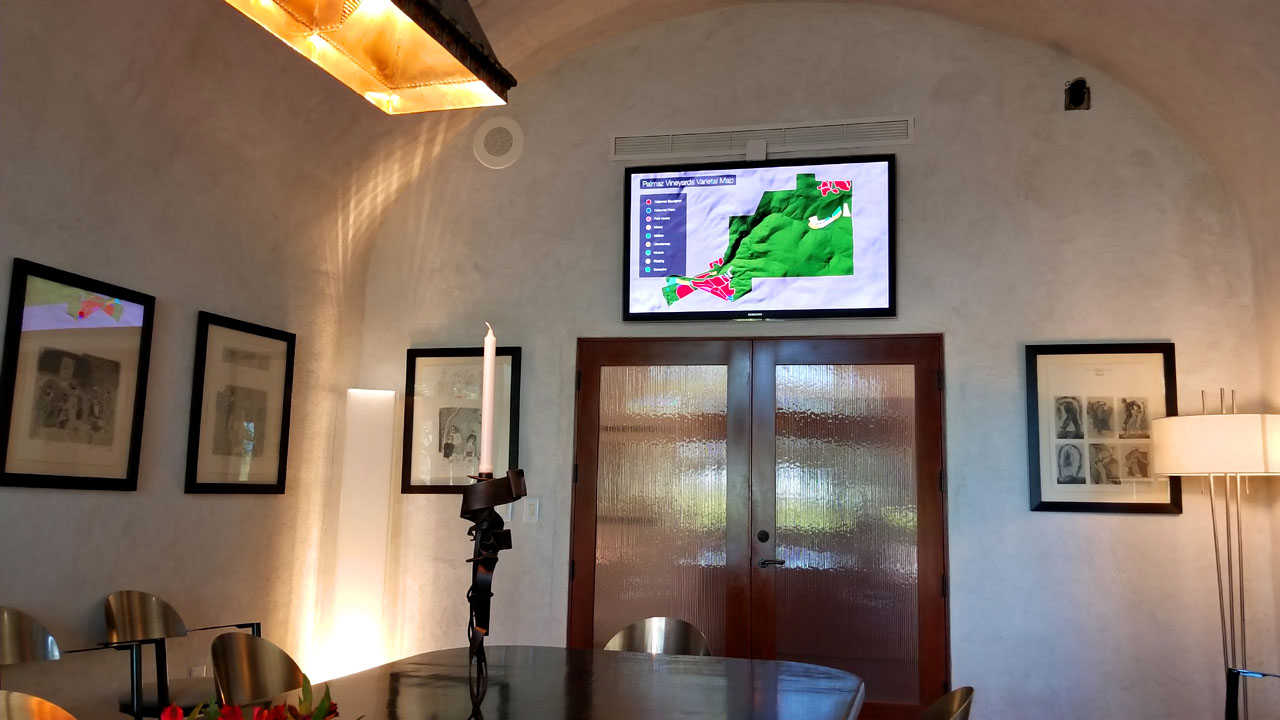
At this point, our group was ushered into a separate room for the wine and food tasting portion of our experience.
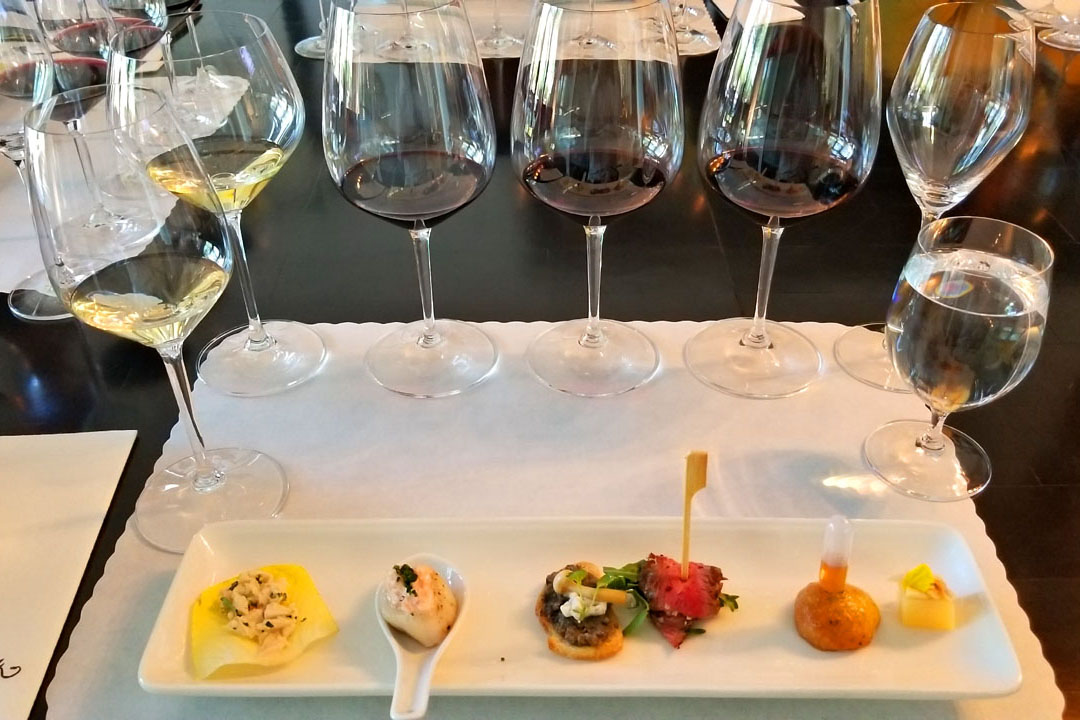
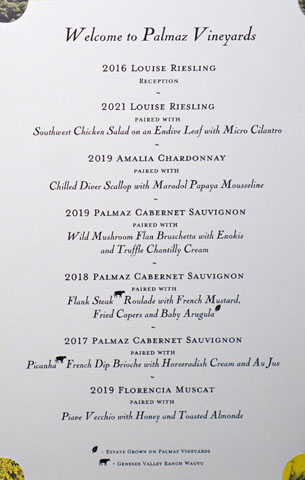
Here we see the tasting setup, along with the printed menu. Click for a larger version.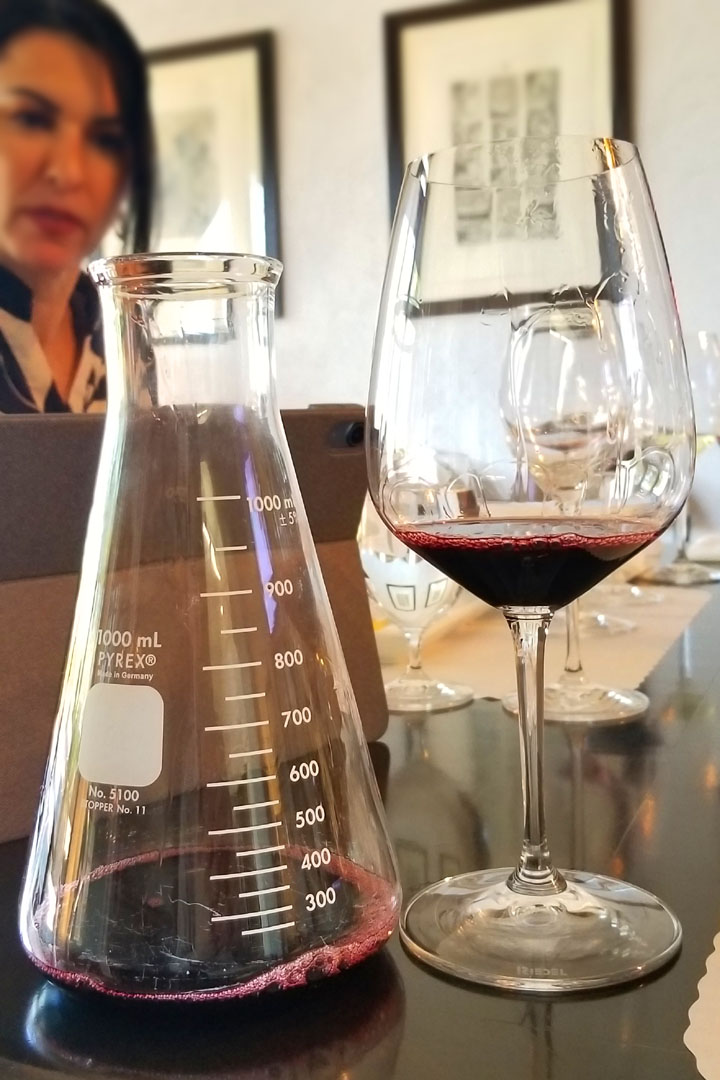
Following the main tasting, we were provided a "bonus" pour of the 2018 Brasas Cabernet Sauvignon, which has some Malbec and a trace amount of Petit Verdot blended in. I found this smoky and herbaceous and lightly astringent on the nose, while in terms of taste, it was quite different, presenting itself as soft, creamy almost, its dark fruit offset a tad by both earth and tannin.
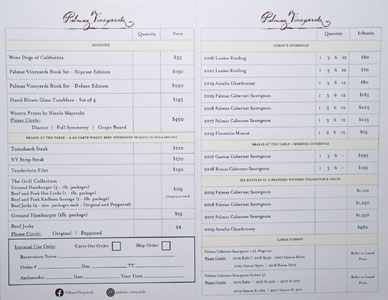
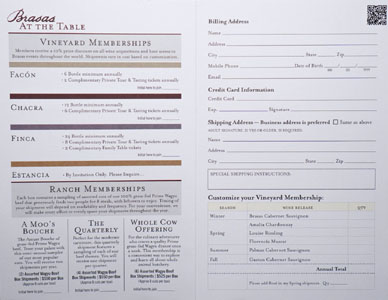
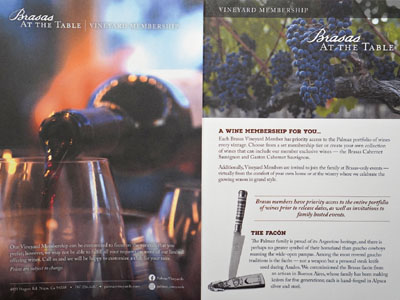
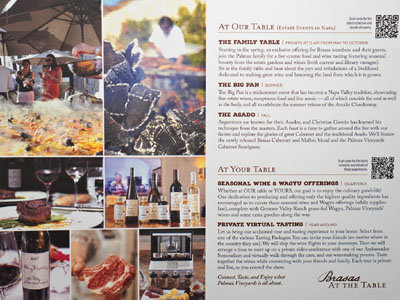
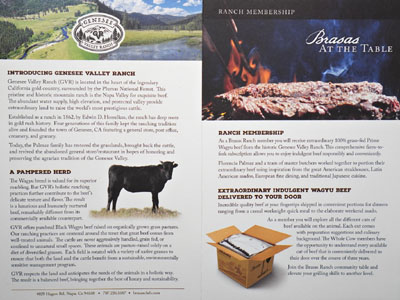
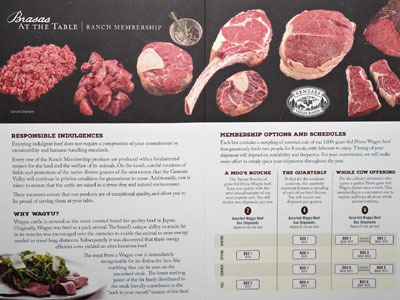
Pictured above are the order form and Brasas membership materials we were provided. Do note that there are memberships for both the vineyard and Genesee Valley Ranch, as the Palmaz family has gotten into cattle-rearing, focusing on grass-fed Wagyu. Click for larger versions.
4029 Hagen Rd, Napa, CA 94558
707-226-5587
www.palmazvineyards.com
Fri 07/26/2024, 11:00a-12:30p
Following dinner at In Bloom in Paso Robles, we drove up the 101 to the tony town of Los Altos, where we spent the night. The following day, we headed up to Napa Valley for a few rounds of wine tasting prior to dinner, and kicked things off with a visit to Palmaz, located on the grounds of Henry Hagen's pioneering Cedar Knoll Vineyard and Winery (founded in 1881). The property had been abandoned after Prohibition, but was purchased and restored in 1997 by Dr. Julio Palmaz (inventor of the coronary balloon-expandable stent) and his wife Amalia Palmaz, both of whom first got interested in wine while Julio was completing his radiology residency at UC Davis. Today, the couple's two children Christian Gastón Palmaz and Florencia Palmaz are also actively involved in the business, as is Christian's wife Jessica Palmaz.
Palmaz's first vintage was in 2000, but the wine was of questionable quality and thus never sold. The 2001 vintage, however, was commercially available, and was overseen by none other than Randy Dunn. In 2003, Winemaker Tina Mitchell joined the team, and she's still responsible for crafting the wines to this day. Palmaz is probably most known for its commitment to gravity-flow winemaking, a process in which wine isn't subject to mechanical pumping, which some believe can damage it at a molecular level. To allow for this, the winery is built into the side of Mount George, and comprises a series of multi-tiered tunnels that reportedly spans the height of an 18-story building.

Palmaz is available for private guided tours/tastings at a cost of $150 per head, and ours began outdoors at one of the winery's upper levels, where we enjoyed a sweeping westerly view of the property.

Our Estate Ambassador poured the 2021 Louise Riesling as a sort of welcome wine. Aromas were all about honey and juicy stone fruits, but with an herbaceous edge. Tasting it, I found soft, sweet peaches countered by a spicy savoriness in the background. This was definitely on the easy-going, quaffable side, and made for a fitting start.

We then moved to a different spot outside, and pictured above is the view to the north.



We were later led back inside to view Palmaz's famed "fermentation dome." The structure is lined with 24 fermentation tanks holding grapes from the property's 46 vineyard blocks, and each is tracked by FILCS (Fermentation Intelligent Logic Control System), and in-house developed fermentation control and monitoring system. Data gathered by FILCS can then be projected onto the ceiling. From those 24 fermentation tanks, the juice is then hosed into settling tanks at the bottom of the dome.

Radiating off the dome are various tunnels containing French oak barrels, where the wine rests for a year. Following, the casks are moved to a lower level for another year of aging.



Our group then went up to the highest level of the dome, where we examined the winery's Pellenc Selectiv' Process Vision 2 optical grape sorter.

Grapes that make it past the sorter fall through an opening to the fermentation tank level.

At this point, our group was ushered into a separate room for the wine and food tasting portion of our experience.


Here we see the tasting setup, along with the printed menu. Click for a larger version.
- 2016 Louise Riesling + Southwest Chicken Salad on an Endive Leaf with Micro Cilantro – We began with a more mature expression of the Riesling from earlier. The wine was more intensely honeyed on the nose, but with an underpinning of offsetting minerality. I found it softer on the palate, but also zippier, with flavors of lush fruit, flowers, herb, and stone. The accompanying chicken salad seemed to draw out the sweetness of the wine, but also resulted in a bit of a peppery finish, which I didn't mind.
- 2019 Amalia Chardonnay + Chilled Diver Scallop with Maradol Papaya Mousseline – The Chard demonstrated a bouquet brimming with nuances of barnyard, butter, grass, and prickly spice, while taste-wise, I found bright, balanced citrus intertwined with soft oak and tropical fruits.
- 2019 Palmaz Cabernet Sauvignon + Wild Mushroom Flan Bruschetta with Enokis and Truffle Chantilly Cream – We sampled three vintages of Cab back-to-back, starting with the youngest of the trio. This one smelled of dark, inky fruit surrounded by a peppery periphery. On the palate, I got lush, jammy berries commingled with oak and some minty, herbaceous qualities. Interestingly, the paired mushrooms seemed to draw out the heat of the wine.
- 2018 Palmaz Cabernet Sauvignon + Flank Steak Roulade with French Mustard, Fried Capers and Baby Arugula – The '18 was the most muted of the three Cabernets on the nose, but did display this sweet, herbal character to go along with its restrained notes of dark fruit. That black fruit continued on into the palate, which veered hot and tannic, with a smoky, spicy edge. A bit brash now, though I'm expecting this one to temper down with age. I actually ended up purchasing a bottle (priced at $205), as I'm curious to see how it'll evolve.
- 2017 Palmaz Cabernet Sauvignon + Picanha French Dip Brioche with Horseradish Cream and Au Jus – Subdued dark berries on the nose, accented by a distinct menthol note and a smidge of earth. Tasting it, I found more of that black fruit intertwined with oak, sweet spices, and persistent tannins.
- 2019 Florencia Muscat + Piave Vecchio with Honey and Toasted Almond – Dessert wine duties were aptly handled by a glass of Muscat that was actually poured later on during our tasting. The sticky showed off a refreshing bouquet filled with pineapple, honey, and herbs. On the palate, think soft and silky, with sugary stone fruit counterbalanced by a minty, slightly astringency quality. A fitting match for the aged Italian cheese.

Following the main tasting, we were provided a "bonus" pour of the 2018 Brasas Cabernet Sauvignon, which has some Malbec and a trace amount of Petit Verdot blended in. I found this smoky and herbaceous and lightly astringent on the nose, while in terms of taste, it was quite different, presenting itself as soft, creamy almost, its dark fruit offset a tad by both earth and tannin.






Pictured above are the order form and Brasas membership materials we were provided. Do note that there are memberships for both the vineyard and Genesee Valley Ranch, as the Palmaz family has gotten into cattle-rearing, focusing on grass-fed Wagyu. Click for larger versions.
0 Comments:
Post a Comment
Subscribe to Post Comments [Atom]
<< Home